Overbooked: The Exploding Business of Travel and Tourism
Elizabeth Becker, Author and Journalist
Photos | Transcript

Washington, DC—On June 12, 2013, author and journalist Elizabeth Becker joined the WFPG to discuss her latest book, Overbooked: the Exploding Business of Travel and Tourism. In her conversation with WFPG Board Chair Maxine Isaacs, Becker discussed the global impact of the travel and tourism industry, including its environmental, political, and economic effects.
Becker was inspired to write on the tourism industry while covering international economics at The New York Times. She referred to tourism as the “stealth industry of the 21st century,” because, in her view, people often have a hard time equating something as “serious” as economics with something as fun as vacation. Becker explained that since the end of the Cold War, the world has opened up to tourism—causing the number of international trips to double from 500 million in 1995 to 1 billion last year. Becker explained that last year, the global contribution of the industry was $6.4 trillion—numbers that make the tourism industry hard to ignore.
Becker outlined the different types of tourism, breaking them down into three general categories—cultural, consumer, and nature. Within these categories, she cited country examples and explained whether they were doing it “right” or “wrong”. Becker also mentioned other types of tourism, like medical tourism, sex tourism, and dark tourism—a sort of genocide tourism that allows travelers to visit sites of the Holocaust, the Rwandan genocide, Cambodia, etc. According to Becker, the most practiced type of tourism is cultural tourism. When done “right”, like in France, tourism benefits the people of the country and protects cultural sites and local heritage. Becker explained that this type of success requires close government involvement and regulation. Becker also cautioned that when not strictly regulated, tourism can cause more harm than good, as in Venice, where tourism is overrunning the city and displacing locals.
Calling the cruises “the fast food of tourism”, Becker spoke at length about the disastrous impact that this industry is having on the environment and on local communities. She titled her chapter on cruises “Destination Nowhere”, because one can spend several days on a ship and only a few hours in a foreign country—usually on a prearranged outing. Destination cities receive all of the disadvantages of tourism (overcrowding, damage to local cultural sites, increased pollution, etc.), almost none of the economic advantages since meals, lodging, and entertainment are all available onboard. Additionally, cruise companies are generally incorporated in countries like Bahamas, Liberia, and Panama to avoid regulations, including those that cover environment impact, safety, and minimum wage.
Another topic of conversation was the role of governments in tourism. Becker described the issue as one of good governance and that government is responsible for enforcing the “basic rules” of tourism, including the monitoring of hotels and respect of residential property rights. Government, in Becker’s eyes, is also responsible for attracting and monitoring foreign visitors, both through providing tourism resources and by controlling the visa process. Becker commended the French government for successfully regulating tourism but added, “Who has the patience for that? The French do, but I don’t know if anybody else does.”
Unlike most countries, the US government does not make promoting tourism a priority, something that Becker says should change. In her view, tourism and government are inseparable. Becker explained that in the 1990s, soon after the world was completely opened up to tourism, the US government cut tourism out of the budget and withdrew from the World Tourism Organization. While other countries were aiming to improve their economies by using tourism, the US was “pulling back.” After 9/11, tourism in the US declined as a result of stricter visa requirements and how tourists were treated at the border. Since these new restrictions, the US has also not hosted a major international sporting event. Becker explained that “it does not cost that much money to promote tourism” and termed the government’s lack of involvement in the industry as a “political issue.” Since coming into office, President Obama has begun measures to improve the tourism industry, but according to Becker the US still has a long way to go.
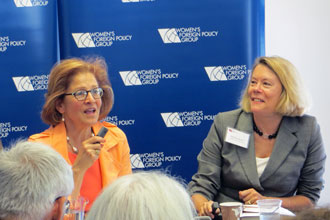 |
 |
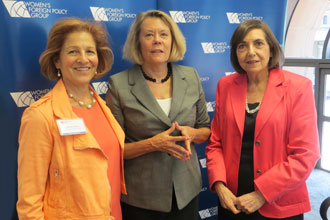 |
WFPG Board Chair Maxine Isaacs begins the
discussion with Elizabeth Becker
|
|
WFPG Board Chair Maxine Isaacs, Elizabeth Becker,
and WFPG President Patricia Ellis
|
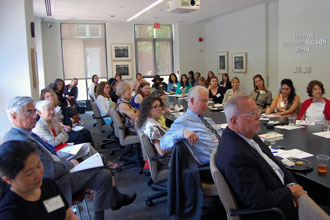 |
 |
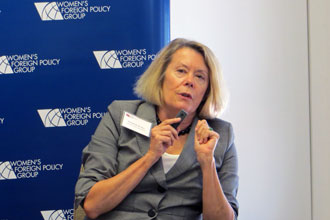 |
Audience listens during Elizabeth Becker's remarks
|
|
Elizabeth Becker speaks about the tourism industry
|
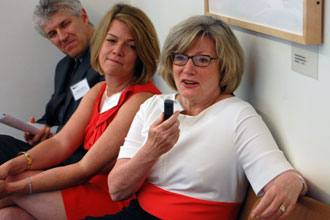 |
 |
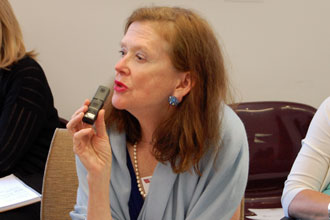 |
| |
|
|
|
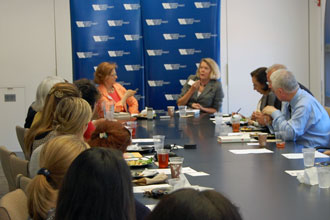 |
 |
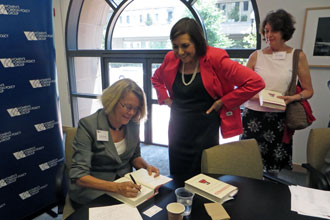 |
| |
|
|